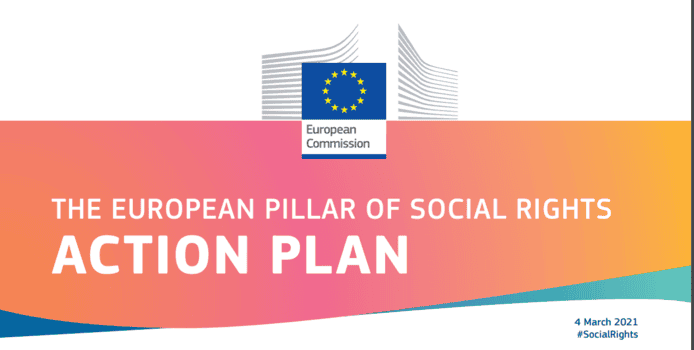EUD Contributes to the European Commission’s Public Consultation on the new Action Plan on the implementation of the European Pillar of Social Rights
The European Union of the Deaf (EUD) has made a contribution to the European Commission’s public consultation on the new Action Plan on the implementation of the European Pillar of Social Rights (hereafter “the Pillar”).
Pillar of Social Rights and its Action Plan (2021-2024)
The Pillar is a set of 20 principles and rights of non-legally binding nature established in 2017. The aim of the principles of the Pillar is to strengthen the social dimension of the EU while increasing the quality of working and living conditions among participating Member States. It encourages Member States to update their social and employment standards and laws to reflect the new realities of work and daily lives. Its principles and rights address three main areas: equal opportunities and access to labour markets; fair working conditions, and social protection and inclusion. It includes a principle (No 17) on the inclusion of persons with disabilities. As the Pillar did not include concrete implementation tools, the European Commission issued an Action Plan in 2021, in the post-Covid context, to translate its 20 principles into action through specific targets and integration into the European Semester.
The Action Plan enabled the EU to launch major initiatives, including the European Strategy for the Rights of Persons with Disabilities (2021–2030) and the Directive on Combating Violence Against Women. In 2025, as foreseen in the 2021 Action Plan, the European Commission is required to review progress and propose a new Action Plan for the Pillar’s implementation in the coming years. This has prompted the public consultation opened by the Commission in the third quarter of 2025.
EUD attaches great importance to the implementation of the European Pillar of Social Rights and has undertaken various actions to advocate for the implementation of the Pillar by producing a toolkit in International Sign for its member organisations, by contributing to the European Commission’s public consultation and strategic dialogue on the Action Plan implementing the Pillar (2020), by hosting webinars to raise awareness on the Pillar (2021) and on the European Semester process (2023) among the deaf communities, and by attending annual meetings of the European Commission with civil society on the European Semesters (2021, 2022, 2023).
EUD contribution:
The EUD contributed to the review of the Action Plan of the Pillar through the European Commission’s call for evidence and public consultation by addressing both the implementation of the first Pillar Action Plan of the European Pillar of Social Rights (2021-2024) and the desired objectives and content of its new Action Plan (2025-2030).
The EUD identified shortcomings in the implementation of the 2021 Action Plan. The European Pillar of Social Rights has 20 principles, but only Principle 17, on the inclusion of people with disabilities, is clearly relevant for deaf people. This is mostly covered by the European Strategy on the Rights of Persons with Disabilities 2021–2030. However, EUD points out that disability is not properly included across the other principles, which makes disability relevant policies less effective.
Under Principle 12 on social protection, the EU did not revise yet the social security coordination rules so that people with disabilities can keep their benefits and access to disability-related services when moving between countries, as recommended by the UN Committee on the Rights of Persons with disabilities. For deaf people, it would mean accessing sign language interpretation services in other Member States, among other benefits and services.
Under Principle 16 on healthcare, the EU has not addressed the specific barriers faced by people with disabilities, especially deaf people, and does not collect disaggregated and intersectional data that shows their needs.
Under Principle 5 on employment, the Disability Employment Package offers some useful tools, but because it has no binding rules, clear funding, or disability-specific data, thereby not guaranteeing positive impact for deaf people.
Furthermore, the EUD made recommendations for the new Action Plan (2025). First, the EU should update its Disability Strategy with a new Action Plan for 2026–2030. This plan should have clear actions, deadlines, and ways to measure progress, and it must be developed together with organisations of persons with disabilities. Deaf people’s right to use their national sign languages should be fully included. Indeed, the EU should officially recognise national sign languages and protect the linguistic rights of deaf sign language users.
Healthcare must become more accessible across the EU. This requires common standards, better disaggregated data collection, EU funding, and a mapping of accessible health facilities, including those for deaf people.
Eurostat should also improve its data collection system, with disaggregation by disability type and other factors such as gender, age, or ethnic origin, and include this in the Social Scoreboard.
Finally, Member States must consult with organisations of persons with disabilities, including National Associations of the Deaf, in a timely and accessible way before sending in their National Reform Programmes.
For a detailed analysis from the EUD on the shortcomings in the 2021 Action Plan and its complete list of recommendations for the new Action Plan (2025-2030) on the implementation of the Pillar, please consult our full contribution here: EUD Contribution to the Public Consultation on the new Action Plan of the Pillar of Social Rights
Timeline:
Following the commitment in President von der Leyen’s 2024–2029 political guidelines to present a new Action Plan, the European Commission will take into account the input collected from the public consultation and Executive Vice-President Mînzatu is expected to present the new Action Plan in 2025. This new Action Plan will build on the 2021 framework and set out initiatives for this mandate to deepen implementation of the Pillar and guide Member States towards achieving the EU Pillar of Social Rights’ 2030 headline targets.













